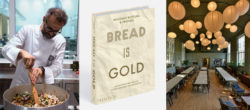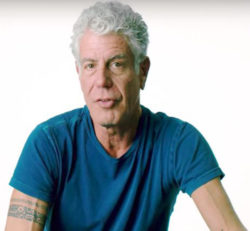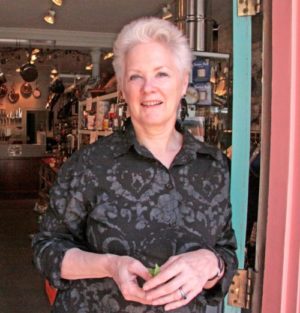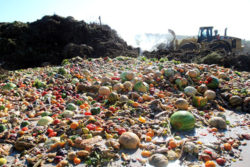Read Time: 5 Minutes Subscribe & Share
A Film for New Year’s Resolutions
One of the purposes of Kitchen Detail has been to go beyond serving as a virtual handbag of recipes to shining a light on food in all its facets. Because it’s so important to keep learning about our food choices and their impact, we highly recommend documentaries that successfully highlight sobering issues around food. The truly fine ones can raise our recognition and even prompt us to change how we organize our grocery purchases and meals. Wasted is one of those films. It forces us to look at some stark realities about how we process food in our homes, supermarkets, and farms, and it offers some realizable personal goals while urging better behavior on the part of our communities and government. We can create change in the process only by using our voices and wallets.
Sobering Statistics From Wasted
10 million tons of produce a year goes unharvested in the U.S.;
90 percent of all wasted food ends up in landfills, where it can take up to 25 years for a head of lettuce to compost; the decomposing food in landfills releases methane gas that contributes to pollution.
Worst among the food wasters are big supermarket chains, which toss out tons of perfectly good food daily because of rotating stock and egregious misuse of “best by” dates. Nearly all of that food heads to landfills.
A Global Perspecitve
The film is full of marvelous visual setups and setdowns, with the ghost of Anthony Bourdain opening and ending the film with his idiosyncratic thoughts on food waste and the human animal that supports it. It also has interviews with Massimo Bottura, who with his wife, Lara Gilmore, has spearheaded a movement in Italy with hopes to realize it in their dining rooms across the globe. They have removed the dreary soup kitchen approach to feeding people in need and replaced it with one of hospitality, lovely surroundings and inclusion. It is worth exploring their website dedicated to this venture: Food For Soul
“Through ar t, design and beauty, we transform neglected spaces into warm and inclusive social hubs, aiming to welcome not only our guests, but the whole community.Our guests come from situations of social vulnerability and food insecurity. We welcome them in beautiful and inspiring environments, invite them to sit around the same table and enjoy hearty and delicious meals, served by a team of volunteers.Meals are made from surplus ingredients that would otherwise go to waste. Markets, supermarkets, producers and suppliers donate perfectly edible, quality food that is transformed into nutritious three-course menus. We aim to unveil the potential of ingredients at every stage of their lifespan. Browned bananas, overripe tomatoes and stale bread are reintroduced into the food chain – with extra value.”
t, design and beauty, we transform neglected spaces into warm and inclusive social hubs, aiming to welcome not only our guests, but the whole community.Our guests come from situations of social vulnerability and food insecurity. We welcome them in beautiful and inspiring environments, invite them to sit around the same table and enjoy hearty and delicious meals, served by a team of volunteers.Meals are made from surplus ingredients that would otherwise go to waste. Markets, supermarkets, producers and suppliers donate perfectly edible, quality food that is transformed into nutritious three-course menus. We aim to unveil the potential of ingredients at every stage of their lifespan. Browned bananas, overripe tomatoes and stale bread are reintroduced into the food chain – with extra value.”
Their organization has also produced a book titiled Bread Is Gold which is more than just recipes. Over 50 chefs worldwide contributed  techniques for dishes using “waste” food for Milan’s Refettorio Ambrosiano in 2015. Printed on parchment, the book is divided into chapters, one for each chef, which begin with vignettes that describe their experience at the first refettorio with photos of the chefs in action and the finished dishes, Learn how to transform neglected ingredients into dishes at home using their creativity. The book is so popular that it is published in English, Italian, French, Spanish and Dutch, and proceeds support the Food For Soul activities
techniques for dishes using “waste” food for Milan’s Refettorio Ambrosiano in 2015. Printed on parchment, the book is divided into chapters, one for each chef, which begin with vignettes that describe their experience at the first refettorio with photos of the chefs in action and the finished dishes, Learn how to transform neglected ingredients into dishes at home using their creativity. The book is so popular that it is published in English, Italian, French, Spanish and Dutch, and proceeds support the Food For Soul activities
Use Everything, Waste Nothing
 “I came up in kitchen regimes where you live by an absolute rule of using everything and wasting nothing, and of course, as a traveler, I see again and again how circumstances force people to cook incredibly well with the often very little food available to them. One film isn’t going to cure all of society’s ills,” Bourdain says. “But if a few people start thinking about what they’re eating for dinner in a different way or think twice about throwing out what is often the best stuff, it’s a good day.”
“I came up in kitchen regimes where you live by an absolute rule of using everything and wasting nothing, and of course, as a traveler, I see again and again how circumstances force people to cook incredibly well with the often very little food available to them. One film isn’t going to cure all of society’s ills,” Bourdain says. “But if a few people start thinking about what they’re eating for dinner in a different way or think twice about throwing out what is often the best stuff, it’s a good day.”
And sandwiched in his film is a lot of useful information, interviews and documentation of what is being done in other countries from Italy to Japan. Wasted exposes one of my personal points of pet peevishness: “best by” dates. This gross mismanagement of food resources in grocery stores is detailed in startling visuals and statistics. We have been groomed, gaslighted even, by the retail food industry on these dates so that even though we are overwhelmed with “choices”, food is thrown out before it needs to be so as to keep feeding an expanding profit line.
What We Can Do
As a nation, we spend less on food than any other and more of our food goes into landfills than any other country. Both France and Italy have outlawed food waste by grocery chains. So here are some thoughts:
Buy less, learn to like leftovers, and push to have your community develop systems that either donate food waste for animal feed or compost. And build awareness in your government representatives that we can use food waste as a component in biofuels as they have done in Murfreesboro, Tennessee – one of several fascinating features in Wasted.
Locally, I was thrilled when a partnership developed between Alexandria and an organization to coordinate compost pick-up areas and times in which citizens could participate. Here’s our post on CompostAlex and the other independent composting movements in the USA. The burgeoning number of farmers’ markets in my area has allowed us to shop for food to the point where just an occasional trip to the grocery store is necessary. We are also grateful for the presence of MOMS, a store showcasing organically and sustainably produced groceries in Alexandria. If there is one in your area, check out this little grocery store that could.
By submitting this form, you are consenting to receive marketing emails from: Kitchen Detail, Via de'Falegnami 5, Bologna, 40121, http://www.lacuisineus.com. You can revoke your consent to receive emails at any time by using the SafeUnsubscribe® link, found at the bottom of every email. Emails are serviced by Constant Contact

Kitchen Detail shares under the radar recipes, explores the art of cooking, the stories behind food, and the tools that bring it all together, while uncovering the social, political, and environmental truths that shape our culinary world.





Comments are closed here.
Follow this link to create a Kitchen Detail account so that you can leave comments!